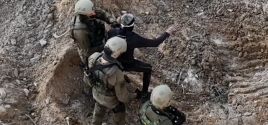Unions oppose ‘draft’ of federal workers to IraqBy DANIEL FRIEDMANFederal Times Dec. 11, 2006 |
Popular 
"We Were There First and Foremost for Our Country of Israel," UNC Frat Bro Tells Fox News

Video Shows Israeli Soldiers 'Using Palestinian as a Human Shield'

BlackRock CEO: 'Xenophobic' Countries With Shrinking Populations May Be The 'Big Winners' in AI-Driven Future

Report: Daily Wire Got Secret Gag Order Against Candace Owens 'While Publicly Negotiating a Debate'

House Passes 'Antisemitism Awareness Act' to Silence Criticism of Israel as Hate Speech
 The Iraq Study Group’s recommendation that the Bush administration consider ordering government civilians to Iraq has drawn outrage from federal employees’ unions. Civilian agencies have been seeking volunteers to assist with efforts in Iraq. But the report states that the potential danger of the assignment means few qualified candidates have taken the offer. Therefore: “In the short term, if not enough civilians volunteer to fill key positions in Iraq, civilian agencies must fill those positions with directed assignments,” the report says. “Steps should be taken to mitigate familial or financial hardships posed by directed assignments, including tax exclusions similar to those authorized for U.S. military personnel serving in Iraq.” Created to advise Congress, the study group has no formal power. It is not clear what chance the group’s recommendations have of adoption. But American Federation of Government Employees President John Gage said that while his organization needs more information, “we are alarmed at the idea of directed reassignments of civilian agency employees to a military war zone.” The recommendation “does little more than advocate a ‘draft’ for federal workers,” Gage said in a Dec. 7 statement. “It’s just like getting any person on the street and telling him or her that working in Iraq is now a condition of employment. The contractors are getting out of Iraq, our soldiers are getting out of Iraq and now there’s an idea to send in federal employees, many of whom are untrained and not prepared for a war zone.” Richard Brown, national president of the National Federation of Federal Employees, said he opposes mandatory civilian deployments: “That doesn’t make even a modicum of sense from what I can see,” he said. Defense Department officials have recently said they may seek legislation or other measures to reduce institutional barriers to deploying civilians overseas, including to Iraq. The Pentagon is reviewing how it designates emergency essential positions, for instance. But officials have stressed that such deployment would be voluntary. A department spokesman did not provide comment by deadline. An Office of Personnel Management spokesman declined to comment. Rep. Danny Davis, D-Ill., in line to chair the House Government Reform subcommittee on the federal work force, called the study group’s recommendation “a good idea.” More civilians in Iraq could help achieve the stability needed for an overall U.S. withdrawal, Davis said. Spokesmen for Reps. Steny Hoyer, D-Md., and Tom Davis, R-Va., whose districts include large numbers of federal employees, did not return calls about the recommendation. |



